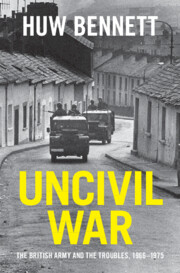Book contents
- Uncivil War
- Cambridge Military Histories
- Uncivil War
- Copyright page
- Dedication
- Contents
- Figures
- Maps
- Tables
- Illustrations
- Abbreviations
- Introduction
- 1 Baggage
- 2 The Army’s Short-Lived Ulster Honeymoon
- 3 Escalation and the Erosion of Impartiality
- 4 Edward Heath’s Bid for Victory
- 5 The Road to Bloody Sunday
- 6 The Most Deadly Year
- 7 Strategy in the Shadow of Loyalist Power
- 8 We Cannot Envisage Peace
- Conclusion
- A Note on Sources
- Acknowledgements
- Notes
- Bibliography
- Index
3 - Escalation and the Erosion of Impartiality
Published online by Cambridge University Press: 03 August 2023
- Uncivil War
- Cambridge Military Histories
- Uncivil War
- Copyright page
- Dedication
- Contents
- Figures
- Maps
- Tables
- Illustrations
- Abbreviations
- Introduction
- 1 Baggage
- 2 The Army’s Short-Lived Ulster Honeymoon
- 3 Escalation and the Erosion of Impartiality
- 4 Edward Heath’s Bid for Victory
- 5 The Road to Bloody Sunday
- 6 The Most Deadly Year
- 7 Strategy in the Shadow of Loyalist Power
- 8 We Cannot Envisage Peace
- Conclusion
- A Note on Sources
- Acknowledgements
- Notes
- Bibliography
- Index
Summary
During the summer of 1970 the British Army’s tactics in Northern Ireland unmistakably shifted into a more aggressive gear. Responsibility is frequently pinned upon Edward Heath’s administration, elected in June. This chapter argues for continuity across the electoral divide as Heath pursued the reform agenda demarcated by his predecessor, Harold Wilson. This chapter refutes the notion that loyalist groups were largely irrelevant in British strategy. Even before the general election, fear of loyalist rebellion deterred strategists from impartially addressing violence from wherever it came. Fear of loyalism fused with over-confidence about the army’s ability to attack and suppress republicanism. From May 1970 the British Army launched a preventative assault on republicans, to ward off the danger of civil war by eliminating the only belligerent deemed defeatable. After the Conservatives gained power, the government sent HQ Northern Ireland additional manpower to pursue the offensive with greater vigour. The major curfew operation in the densely populated Catholic Falls Road area in Belfast in July is placed within the broader context of the assault on the IRA. When the first soldier was killed in February 1971, Prime Minister Heath felt public opinion in Britain now expected republicanism to be crushed.
- Type
- Chapter
- Information
- Uncivil WarThe British Army and the Troubles, 1966–1975, pp. 66 - 92Publisher: Cambridge University PressPrint publication year: 2023

